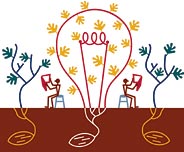| Unexpected Revolutions | 2004-01-01 15:57 4 comments |
 by Flemming Funch by Flemming FunchArticle in NY Times about how history often will demonstrate huge consequences of initially very casual decisions. The countries in the middle east were created by arbitrary lines drawn on empty maps by bureaucrats trying to split up the former Ottoman Empire. Such lines being the cause of much strife in following decades. Or the world changing effects of little changes and improvements in material. We never know where change will take us. In a 1994 essay on military revolutions, "Cavalry to Computer," the historian Andrew F. Krepinevich described the advent of the six-foot yew longbow during the Hundred Years' War in the 1300's and 1400's. By substituting yew for heavier woods, an archer could carry a bow into battle that could pierce the armor of a cavalryman. Mr. Krepinevich warns that technology alone does not change the course of war; any advance must be coupled with changes in the structure and operation of a military unit. But the changes made possible by the yew longbow were a factor in a more powerful role for the infantry, and a competitive advantage for England in that conflict and beyond. Of course, if we actually try deliberately to transform the world, the question becomes which decisions and improvements we can fairly easily make today which will have the most beneficial effect on the future. What memes can we create that surprisingly turn into something hugely wonderful later on. Tim Berners-Lee just received a knighthood. The guy who invented the World Wide Web. Same thing there. It was 'just another program' he said. Yeah, but the right kind of program at the right time to change the world. |